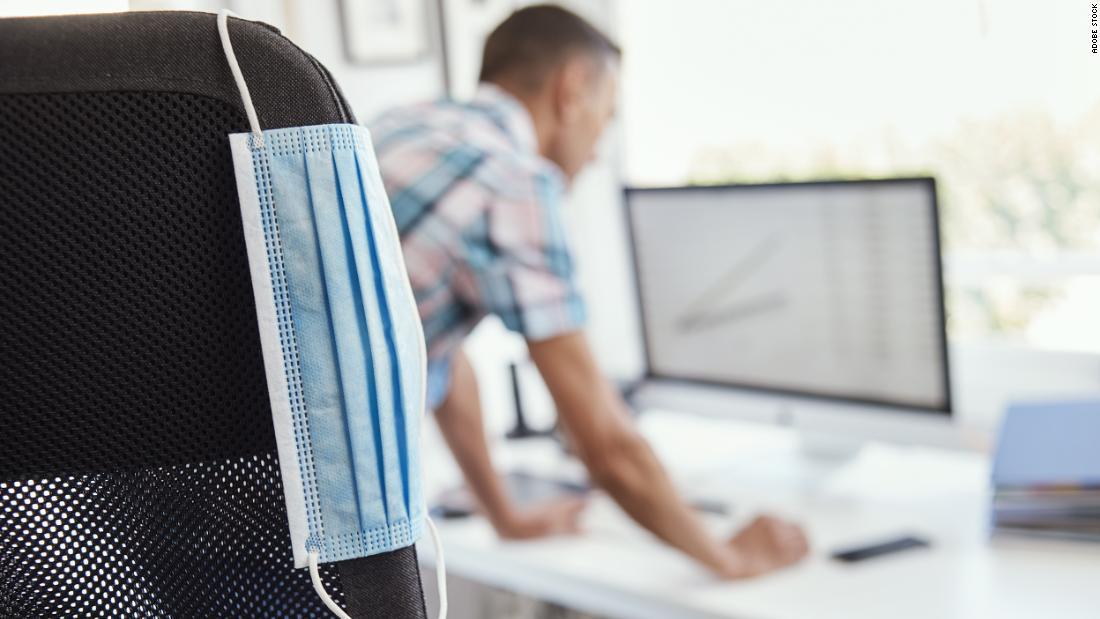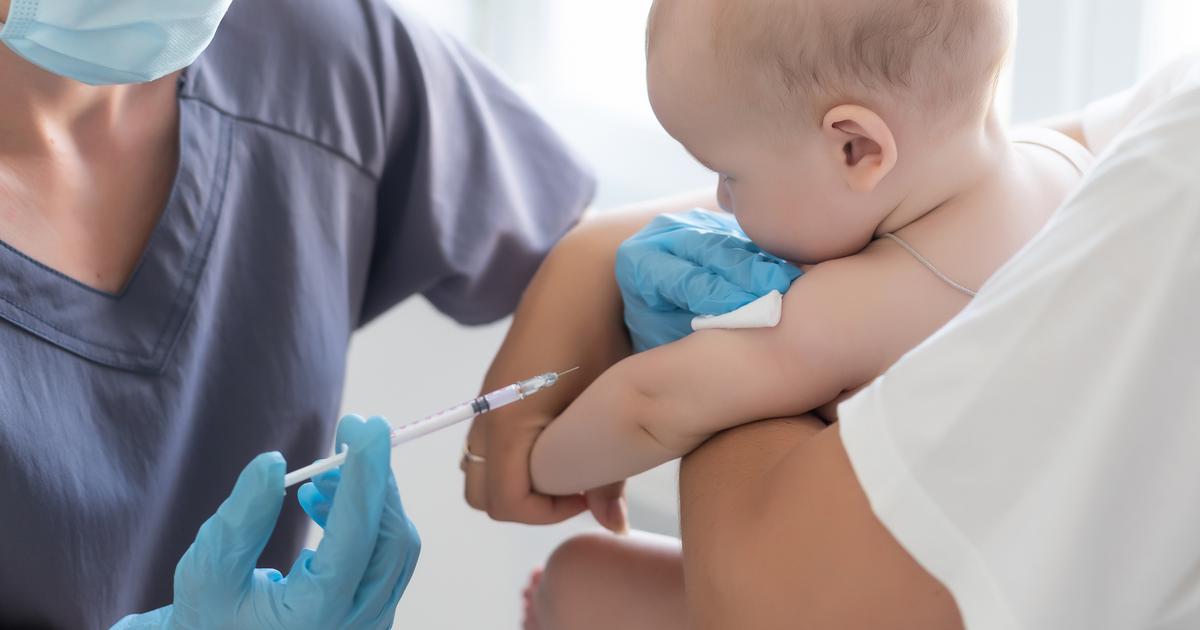Survey blames unvaccinated people for covid-19 infections 0:53
(CNN) -
The U.S. Centers for Disease Control and Prevention (CDC) amended its guidelines to recommend once again that even vaccinated people begin wearing masks indoors in areas of the country with a high and considerable spread of the coronavirus.
The key to his decision was a study showing that fully vaccinated people can continue to transmit the delta variant.
At the same time, Disney, Netflix, Google, Walmart and the federal government announced plans to implement some type of vaccination requirement for employees returning to work in person.
Is it legal to require vaccination against covid-19?
In many circumstances, yes
Is it safe for vaccinated people to return to work if vaccination requirements apply?
What if they are not?
Is the use of masks enough, and what if others around you are not vaccinated and do not wear masks?
What about workers who have children too young to be vaccinated?
To help us navigate these uncertain times, we turned to CNN Medical Analyst Dr. Leana Wen.
Wen is an emergency room physician and visiting professor of health policy and management at the Milken Institute School of Public Health at George Washington University.
She is also the author of a new book, "Lifelines: A Doctor's Journey in the Fight for Public Health."
Survey blames unvaccinated people for covid-19 infections 0:53
CNN: We know that post-vaccination infections can occur. What good is it that vaccines are mandatory if the vaccinated can also spread covid-19?
Dr. Leana Wen:
Vaccination requirements will help make workplaces much safer for everyone.
Here's why: There are a lot of misunderstandings about what the new CDC data shows.
The agency found that vaccinated people infected with COVID-19 can carry the same amount of virus as those who are not vaccinated and have COVID-19.
advertising
Infections in people vaccinated against covid-19, who is more vulnerable and how to prevent them?
However, the chance of actually contracting COVID-19 is greatly reduced if you are vaccinated.
According to Dr. Anthony Fauci, the risk of contracting the coronavirus is estimated to be eight times lower if you are vaccinated than if you are not, and the risk of suffering a disease serious enough to cause hospitalization and death is estimated it's 25 times smaller, which is really remarkable.
Really important slide by Dr. Fauci @WHCOVIDResponse.
Getting vaccinated decreases your chance of hospitalization & death by 25-fold.
It also decreases your chance of getting # covid19 by 8-fold, meaning it's much safer to be around someone vaccinated than unvaccinated.
pic.twitter.com/LS6lOflOgR
- Leana Wen, MD (@DrLeanaWen) August 2, 2021
In other words, if I have to spend time in a closed space, indoors, with someone, the possibility that that person has the coronavirus and can infect me is approximately eight times lower if they are vaccinated. That's why vaccination requirements at work make sense. This dramatically reduces the chance of your coworkers getting infected. And since you are also vaccinated, your chance of getting COVID-19 through them is also reduced approximately eight times compared to if you were not vaccinated.
Is it possible that someone has the coronavirus and that you contract it from him?
Yes. The higher the coronavirus transmission rate in your community, the more likely someone is to have covid-19, even if they are vaccinated.
However, it is much safer to share space with people when everyone is fully vaccinated.
CNN: What if the workplace allows people to choose not to get vaccinated if they get tested?
Wen:
It depends on the frequency of the tests. Testing is not a strategy to prevent someone from contracting Covid-19. However, if the tests are frequent, they could quickly detect infections and prevent that person from spreading them. I would be more comfortable with tests twice a week than with weekly tests. Both the antigen test and the PCR test should be fine, as long as they are cleared by the FDA.
If you test less frequently, I think you get into a false security situation.
Just because someone tested negative a week ago doesn't mean they haven't been able to get the coronavirus since.
And if they are not vaccinated, they have a greater chance of contracting covid-19 and, therefore, of spreading it.
Fully vaccinated people should be tested for COVID-19 if they have mild symptoms, says NIH director
CNN: Should workplaces require both vaccination and the use of masks?
Wen:
This is an interesting question, and one that the CDC hasn't really considered.
At this time, the CDC says that the use of masks indoors should occur in areas of high or substantial transmission of covid-19, and does not say that if everyone is vaccinated, masks are no longer necessary.
I think this is a mistake.
The risk of vaccinated people transmitting to other vaccinated people is low.
At some point, we have to accept that we are not going to get zero risk.
Workplaces have to protect their employees, and requiring a vaccine is a very good level of protection.
If a workplace actually has a vaccination mandate with proof of vaccination, I think they could make wearing the mask optional rather than mandatory.
They reinforce anticovid-19 measures in the United States 2:57
That said, some individuals may choose to be more careful at work.
That too is completely understandable.
I hope the workplaces allow for adaptations.
For example, there may be some people who are immunosuppressed.
They may not want to sit in a crowded conference room with unmasked but vaccinated colleagues, because even a small risk for them is too much.
I hope that employers will allow these employees to work from home, or be in a separate physical space and call virtual meetings.
Of course, not all workplaces can reasonably make these accommodations, and this is once again why vaccination requirements are so important.
They substantially reduce the risk.
Fully vaccinated organ transplant recipients are 485 times more likely to be hospitalized or die from COVID-19, study finds
CNN: What if a workplace doesn't require vaccinations? Is the use of the mask enough? Or what about places that don't require any?
Wen:
A workplace that does not require vaccinations, but still adheres to strict mask use and distancing, and has good ventilation, is also quite safe. Adding the evidence on top of that will be a very useful extra layer of protection. The quality of the mask is important: in these situations, people should wear at least a three-layer surgical mask. And it is important that everyone wears the mask consistently, not hanging from the neck, but completely covering the nose and mouth.
If the workplace does not require vaccines or masks, and you know that you are surrounded by people without masks who are probably not vaccinated, that is a much riskier situation for you. Keep in mind that you are still well protected against serious diseases, but depending on the infection rate in the community around you, you could be at risk of a post-vaccination infection.
Try to take steps to protect yourself.
Wear an N95 or KN95 mask when around these people without a mask and with unknown vaccination status.
Try to stay away from them and, if possible, ask permission to sit in a separate space.
Open the window and door to increase air flow.
Stay away from crowded gathering areas like break rooms and coffee shops.
Keep in mind that the risk is cumulative.
The more people exposed, the greater the risk.
You can also see if other employees feel like you.
More and more work centers impose the obligation to be vaccinated, or at least to undergo a test.
It is possible that in your workplace those who want these mandates are the majority.
Their voices need to be heard and they could make a difference.
CNN: What is your recommendation for parents of young children or people who live at home with immunosuppressed family members? Should they try to keep working from home?
Wen:
This is really difficult.
Many people find themselves in this situation where we may not be so concerned about a post-vaccination infection for us, because it is most likely mild, but we are very concerned about potentially being a carrier that can infect those we live with.
Covid-19 patients overflow hospital in Louisiana 0:36
Taking precautions at work is important. The requirement for the vaccine would make me feel much safer. I would feel comfortable going to work, and without wearing a mask, if everyone around me guarantees that they are fully vaccinated. I'd probably keep trying to stay out of riskier environments like cramped, stuffy conference rooms where dozens of people sit shoulder to shoulder for hours.
If I am not convinced that the people around me are vaccinated, I would make sure to wear a high quality mask when I am around them indoors.
Other people will be even more cautious.
Someone living at home with an elderly parent who takes immunosuppressive medications may want to follow CDC guidelines to the letter and wear a mask even though they know that everyone around them is vaccinated.
Others may choose to work at home if it is an option available to them.
We all have different tolerances for risk, and I hope that companies will try to make reasonable adjustments for people's life situations.
This is a very confusing time for everyone.
It appears that the United States has taken a step back in our fight against the pandemic, and it has.
The delta variant has changed things again.
We need to continue to be vigilant, reassess our own risk and that of our family, and keep in mind that vaccination remains key to protecting ourselves and our loved ones.
Covid-19














